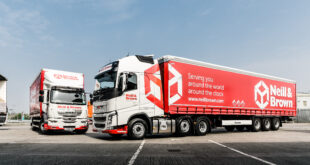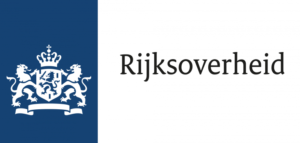(This message comes from the website of the Rijksoverheid)
On the proposal of Minister Van Nieuwenhuizen for Intrastructure and Water management, the Dutch Cabinet has agreed to the starting-points for truck levying. The levy implies that inland and foreign transport by truck will be paying for road use. The income generated by the levy will be used in consultation with the transport industry for the purpose of reducing truck road tax and for innovation and increased sustainability of truck transport.
The policy framework to be sent by Minister Van Nieuwenhuizen to the Dutch Second Chamber (representatives) will outline the truck levy to be introduced. The levy will be applied to inland and foreign trucks as of 3,500 kg maximum gross weight. Agricultural and forestry tractors, mobile cranes and restricted-speed vehicles will be exempt from the truck levy since these vehicles are not primarily intended for goods transport. The same applies to buses. The policy framework furthermore specifies a limited number of transport categories exempt from a levying obligation, like military vehicles, fire engines and garbage trucks.
The truck levy will apply on all motorways in the Netherlands. In addition, and in consultation with regional road operators (provinces, municipalities and water boards) it will be established per province what regional and local roads are also to be subjected to levying. This is important in order to prevent through truck traffic diverting to underlying roads, which might impact road safety on local and regional level and quality of life in communities. Based on her consultations with the regions, the minister will eventually define the road network to be subjected to truck levying. The levy will not apply on roads on which tolls are already being charged or will be charged in the near future.
The plans start from the European road charging directives. These directives presuppose that the height of a levy depends on the environmental characteristics of the truck used: the cleaner, the lower the charge due. The various tariff heights must still be established. The average German and Belgian rate (about € 0.15 per km in either country) was presupposed in the studies into the effects of levying. Truck levying is already applied in Belgium, Germany, Hungary, Austria, Poland, Russia, Slovak Republic, Slovenia, Czech Republic and Switzerland. In France, Italy and Spain on the other hand, trucks are already paying tolls on motorway use.
The policy framework lays the basis for the levying bill and the preparations leading towards realising the truck levy. As soon as the bill is completed it will be submitted for online inspection in order to enable all parties to respond. To establish the way in which the proceeds are to be spent, a sustainability and innovation agenda will be composed in close consultation with the transport industry, worked out into concrete measures. Actual introduction of the levy is envisaged by 2023.
 DKV BeNeLux You drive, we care
DKV BeNeLux You drive, we care

